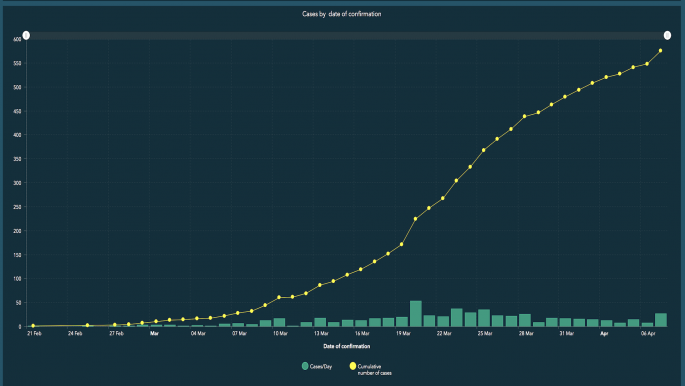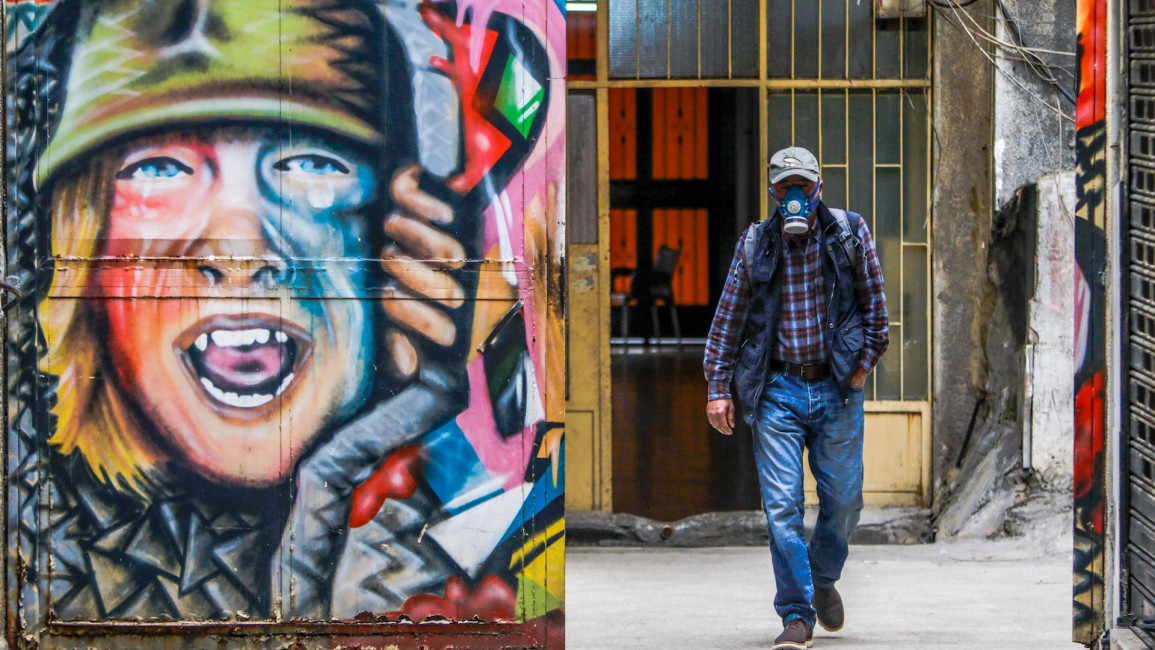Is Lebanon close to containing the coronavirus outbreak?
The country’s health ministry announced 27 new Covid-19 cases on Wednesday, bringing up the tally of confirmed infections to 575. The recent hike is not cause for alarm, authorities said.
Official figures had signalled a drop in the number of new cases last week, before new outbreak clusters were detected in a group of residents and medics in Lebanon’s north and evacuated repatriates tested upon arrival.
A video of Public Health Minister Hamad Hasan promising a brighter future ahead for Lebanon, regarding the Covid-19 outbreak, was shared widely over the past week.
"The journey is close to an end. I want to promise you hope. I want to promise you that the future we are heading to is bright, God willing," Hasan said in the broadcast footage, but did not specify a time frame for loosening the lockdown currently in place for nearly a month.
The official warned that any "mistakes" in this stage could risk erasing all efforts to contain the virus so far. "We have worked [diligently] and we need to stay cooperative," he added, reiterating orders to stay home.
The Bcharre district in north Lebanon - one of the virus transmission cluster regions - was quickly put on complete lockdown, and all returning travellers are being tested upon arrival and quarantined separately in hotels until results came out, the ministry said.
 |
|
Graph tracks cases by day [MOPH] Click to enlarge |
A report released by the government body the same day said the strategy it has adopted to fight the virus aims to "flatten the curve," while simultaneously increasing the capacity of medical institutions in the country to deal with new and existing cases.
Based on "realistic estimations," Lebanon has the capacity for handling a cumulative of 5,000 cases of Covid-19 factoring in that infections would not occur all at the same time, and that only 20 percent of cases will need hospitalisation, the report said.
The strategy will help the health sector "adequately respond to this pandemic," the statement, attributed to Director General Walid Ammar added.
Surge in numbers: 12 Passengers who arrived at Beirut’s airport test positive
 |
|
| Lebanon closed its airport to commercial flights on February 22 [AFP] |
The minister, Hasan, was at the head of security forces and other officials overseeing health and safety measures at the Beirut airport Tuesday evening – when a flight carrying over a hundred repatriates from Paris arrived.
"Everything was carried out in an ideal manner, and what we did in cooperation with all parties involved, showed the unity of Lebanon’s government and its effective role," Hasan said, speaking from the airport.
"We hope no infections will be reported, God willing, and repatriates and their families will be safe," he said at the time. "We also hope to keep this low average of infections recorded in recent days,” the official added.
The minister said that tests from previous repatriation flights had all returned negative. Only one passenger, who was flying on a private flight with an oil-exploration team was carrying the infection, he explained.
 |
|
| Click to enlarge |
The next day, new test results came back from the lab, with four of the Paris flight passengers testing positive. Seven on a seperate flight from Madrid were also confirmed to have the virus.
Despite the relatively low percentage of positive results in travelers, politically-motivated fear-mongering media reports were pitting locals against returning expats and travelers, Etienne Deeck, one of the passengers on the Paris-Beirut flight told The New Arab.
Deeck said samples for PCR lab tests were collected immediately upon arrival, and "all necessary precautions were taken."
Security forces escorted all tested returnees to several branches of Lancaster hotels, where they were provided free accommodation and isolated in quarantine until results came back, he explained.
A Lebanese studying in Paris, Deeck signed up for the embassy return after the outbreak in the French capital escalated and supermarket stocks in his neighbourhood nearly ran out.
"You'd be lucky if you didn't get sick just waiting in line to buy water there," he said. "If I stayed, I would have had a hard time accessing treatment as a foreigner if I ended up catching the virus."
Deeck tested negative and was allowed to go to his home Wednesday evening.
Regional outbreak clusters: Outpouring support as Bcharre goes on complete lockdown
 |
|
| Lebanon's north is the nation's hardest-hit by the coronavirus [Getty] |
A hashtag in Arabic saying 'here is Bcharre' was one of the top online trends in Lebanon Thursday – when a full lockdown of the northern region went into full effect with the supervision of security forces – to contain the spread.
The decision to restrict entry and exit from the region was announced the day before by Minister Hasan, following the official’s visit to the Bcharre Governmental Hospital, where a cluster of 12 new infections were detected.
Read also: Besides coronavirus, Lebanon has an equally dangerous outbreak on its hands - unemployment
During the visit, a hospital representative told reporters cases were being reported in clusters due to the rigorous tracking of people who had recently been in close contact with cases returning positive results.
The total number of cases in Bcharre reached 45 on Thursday, compared to 105 in the capital Beirut and 122 in Metn, which has the highest number of coronavirus infections per district.
"I salute all Bcharre [residents] who are not in hiding from a reality we are all are drowning in," one twitter user wrote, applauding the district’s transparency in handling the virus outbreak.
The World Health Organization has classified Lebanon's outbreak as a level three, which indicates moderate but clustered regional spread.
To soon to conclude: Outbreak still in priliminary stage, more tests needed
 |
|
| Lebanon is only testing around 1000 people per day, according to the head of the coronavirus-designated Rafik Hariri hospital. [AFP] |
Last week's drop in new cases can be attributed to the low number of tests, which ranged between 200 to 600 per day that week, said Sirine Anouti, a public health professional working on Covid-19 research coordination with the Lebanese Epidemiological Association.
Anouti told The New Arab that the hike that followed was "expected," as testing increased with the repatriation of Lebanese from abroad.
|
In general, about 80 percent of infection cases are either asymptomatic or have mild symptoms.
Because of the low testing capacity nationwide, testing costs, social stigma, Anouti said many cases are likely to remain undetected.
"That's why it's important that we commit to social distancing measures on both short and long terms," she added.
Lebanon confirmed its first coronavirus infection on February 21. Following a surge in cases, strict measures were put in place to prevent the spread, and the country shut its sole international airport to commercial flights.
Less than a month after the first case was confirmed, on March 16, Lebanon went on a lockdown. A dusk-to-dawn curfew was introduced, and people were warned not to leave their houses unless absolutely necessary. And this approach seems to be working in keeping the numbers under control.
However, Ghassan Hasbani, a former Health Minister warned against jumpting to early conclusions in an interview with local television MTV.
"We should not rush to announce that we’re at a safe stage....everyone must stay home".
Follow us on Facebook, Twitter and Instagram to stay connect



